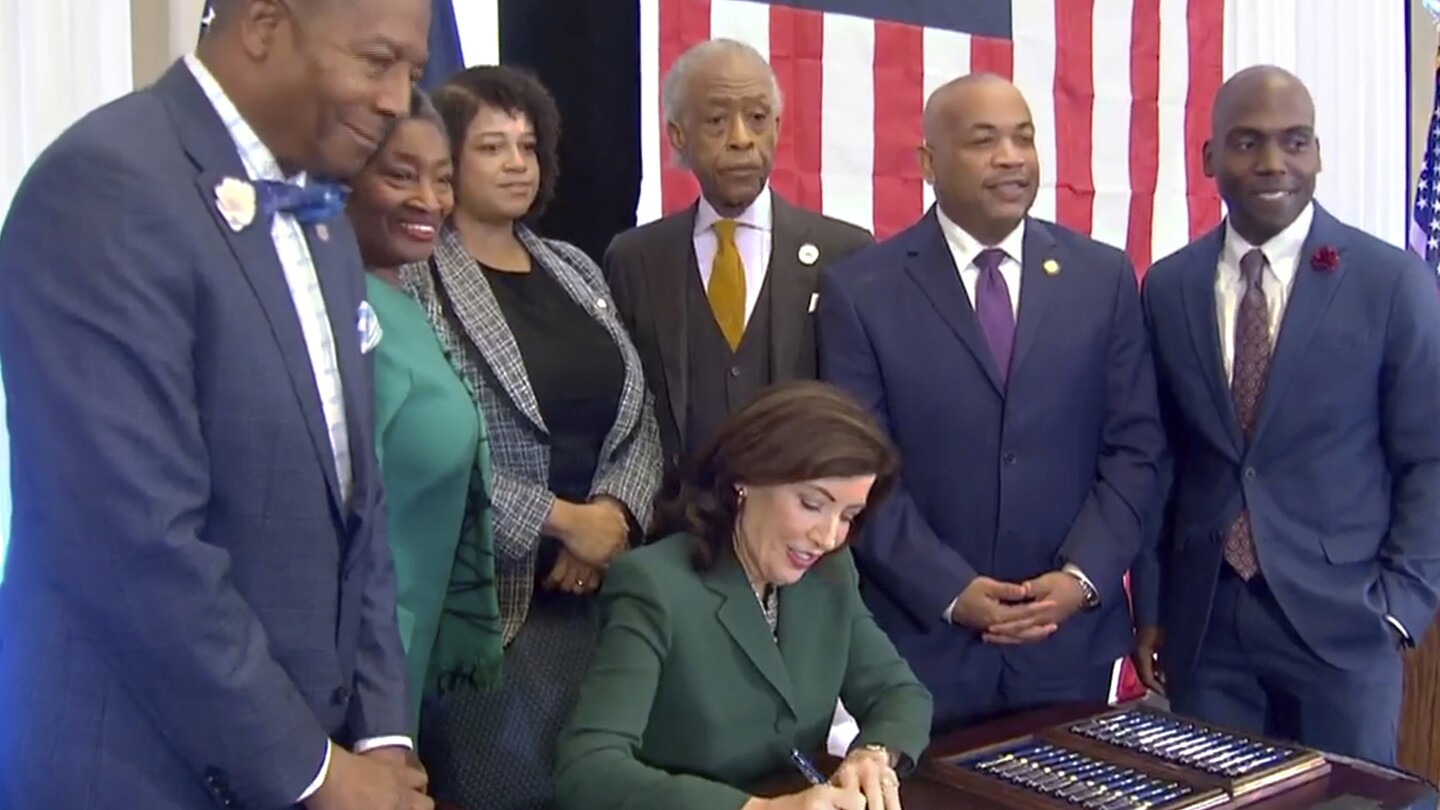New York state will create a commission tasked with considering reparations to address the persistent, harmful effects of slavery in the state, under a bill signed into law by Gov. Kathy Hochul on Tuesday.
It comes at a time when many states and towns throughout the United States attempt to figure out how to best reckon with the country’s dark past, and follows in the footsteps of similar task forces established in California and Illinois.
“In New York, we like to think we’re on the right side of this. Slavery was a product of the South, the Confederacy,” Hochul, a Democrat, said at the bill signing ceremony in New York City. “What is hard to embrace is the fact that our state also flourished from that slavery. It’s not a beautiful story, but indeed it is the truth.”
The law, which was passed by state lawmakers in June, says the commission will examine the institution of slavery, which was fully abolished in New York by 1827, and its ongoing impact on Black New Yorkers today.



As do the descendants of slaves who have those same amenities available.
That’s not the argument you think it is. Also, my family came over poor on both sides. We weren’t the ones doing the oppressing.
Black people were systematically prevented from benefiting from those amenities for generations (and sometimes still are).
My family are poor immigrants on both sides too. That doesn’t matter. If you buy a house and later find out that the plumbing is bad, that is your responsibility even though you didn’t create the problem. We inherited this country and with it the obligation to fix the broken parts.
I understand what you’re saying but disagree with your ultimate conclusion.
The average modern-day American did not directly benefit from slavery and many didn’t even come to the country until after slavery had been long since abolished. Some of those people were also treated as ethnic minorities though they may be seen as “white” now. Which is to say, they were terribly disadvantaged in the American economy because they were immigrants or descended from the “wrong” background.
Any reparations that are to be made should be made by the perpetrators or those who have directly benefited from said perpetrators’ actions. To tax other impoverished lineages in order to provide reparations to another group which had it even worse is unjust.
I do firmly believe that the country needs to address its systemic issues, but I don’t believe that taxing the majority to give cash to the aggrieved is the solution.
It is an undeniable fact that modern Americans benefitted from slavery and black Americans are still harmed by it.
In US counties today, a larger local slave population in the past was correlated with lower percentages of uninsured white people, higher white median incomes, lower white poverty rates, higher white homeownership rates, and lower percentages of white people on food stamps.
http://www.wipsociology.org/2019/10/10/the-past-is-the-past-how-slavery-still-benefits-white-americans/
Slavery was an early driver of economic growth. The US simply would not be in the high economic position it is now and the African countries who were raised for their population would not be so comparatively impoverished.
https://equitablegrowth.org/new-research-shows-slaverys-central-role-in-u-s-economic-growth-leading-up-to-the-civil-war/
https://www.forbes.com/sites/hbsworkingknowledge/2017/05/03/the-clear-connection-between-slavery-and-american-capitalism/?sh=4c1b5d6d7bd3
The perpetrator of slavery was ultimately the American government who made it legalized, encouraged, and enforced it. As the current stewards of our government, we are all responsible for the harm done in the past and the harm still being done to our fellow Americans.
I acknowledged that previously. Regardless, once again, I fully understand what you’re saying but don’t agree with your conclusion.
So basically you acknowledge black people are harmed by past slavery, but don’t think anything should be done about it. Nice.
No. Not what I said at all.